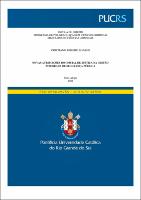| Share record |


|
Please use this identifier to cite or link to this item:
https://tede2.pucrs.br/tede2/handle/tede/10565Full metadata record
| DC Field | Value | Language |
|---|---|---|
| dc.creator | Soares, Cristiano Ribeiro | - |
| dc.creator.Lattes | http://lattes.cnpq.br/0766294730247715 | por |
| dc.contributor.advisor1 | Söhngen, Clarice Beatriz da Costa | - |
| dc.contributor.advisor1Lattes | http://lattes.cnpq.br/9266060091300509 | por |
| dc.date.accessioned | 2022-11-29T13:32:17Z | - |
| dc.date.issued | 2022-10-07 | - |
| dc.identifier.uri | https://tede2.pucrs.br/tede2/handle/tede/10565 | - |
| dc.description.resumo | O objeto da presente dissertação é a análise do processo de enfraquecimento da carreira do oficial de justiça, bem como a proposta de alternativas envolvendo uma gestão integrada de Segurança Pública. Parte-se, inicialmente, do resgate dos registros da carreira nos ordenamentos pátrios com o objetivo de investigar a aproximação do cargo de executor de mandados com o Sistema de Justiça Criminal. Para tanto, são descritas as atribuições normatizadas nos diplomas processualistas penais desde o Brasil Colônia até o presente momento. Explora-se o cenário funcional do cargo com suas dificuldades e contradições. Neste ponto, é compilada a descrição do cargo de acordo com as variáveis de nomenclatura e requisitos de escolaridade para o ingresso na carreira em todas as unidades da federação. Adiante, analisa-se como a tecnologia e a automação, aceleradas pela pandemia de covid-19, contribuíram para um esvaziamento das funções do oficial de justiça. Busca-se, assim, compreender a crise na carreira que orbita o oficial de justiça. Em seguida, pesquisa-se sobre a proposta de gestão integrada da Segurança Pública, com conceitos e evoluções das políticas públicas a partir da redemocratização até a edição da Lei N.º 13.675, que institui o Sistema Único de Segurança Pública – SUSP. Ao final, constrói-se um diálogo entre o problema de pesquisa, qual seja, a desfuncionalidade do oficial de justiça, e uma hipótese de solução, com a utilização de uma gestão integrada da Segurança Pública. Como resultado, verificou-se a viabilidade de o oficial de justiça como um dos atores na gestão integrada da Segurança Pública, albergando novas atribuições, como as atividades de inteligência e de operacionalização das ferramentas dos sistemas de informação. Concluiu-se que o profissional em análise já realiza as atribuições sugeridas, mas em pequena escala e com falta de respaldo legislativo. | por |
| dc.description.abstract | The object of this dissertation is to analyze the process of weakening the career of the bailiff and propose alternatives involving an integrated management of Public Security. It starts, initially, with the rescue of career records in national legal systems with the objective of investigating the approximation of the position of executioner of warrants with the criminal justice system. To this end, the attributions standardized in criminal procedural diplomas from colonial Brazil to the present moment will be described. The functional scenario of the position with its difficulties and contradictions is explored. At this point, the description of the position will be compiled according to the variables of nomenclature and education requirement for entry into the career in all units of the federation. Further on, it is analyzed how technology and automation, accelerated by the COVID-19 pandemic, contributed to a hollowing out of the functions of the bailiff. Thus, we seek to understand the career crisis that orbits the bailiff. Then, research is carried out on the proposal of integrated management of Public Security, with concepts and evolution of public policies from the redemocratization until the enactment of law nº 13.675, which establishes the Single Public Security System - SUSP. In the end, a dialogue is built between the research problem, that is, the dysfunctionality of the bailiff, and a hypothesis of solution, with the use of an integrated management of Public Security. As a result, the viability of the bailiff as one of the actors in the integrated management of Public Security was verified, housing new attributions such as intelligence activity and information systems tools. It was concluded that the professional under analysis already performs the suggested attributions, but on a small scale and with a lack of legislative support. | eng |
| dc.description.provenance | Submitted by PPG Ciências Criminais ([email protected]) on 2022-11-23T14:13:37Z No. of bitstreams: 1 CRISTIANO_RIBEIRO_SOARES_DISS.pdf: 1941468 bytes, checksum: a50934723010748e74fde50b1d16d0b2 (MD5) | eng |
| dc.description.provenance | Approved for entry into archive by Sheila Dias ([email protected]) on 2022-11-29T13:18:10Z (GMT) No. of bitstreams: 1 CRISTIANO_RIBEIRO_SOARES_DISS.pdf: 1941468 bytes, checksum: a50934723010748e74fde50b1d16d0b2 (MD5) | eng |
| dc.description.provenance | Made available in DSpace on 2022-11-29T13:32:17Z (GMT). No. of bitstreams: 1 CRISTIANO_RIBEIRO_SOARES_DISS.pdf: 1941468 bytes, checksum: a50934723010748e74fde50b1d16d0b2 (MD5) Previous issue date: 2022-10-07 | eng |
| dc.format | application/pdf | * |
| dc.thumbnail.url | https://tede2.pucrs.br/tede2/retrieve/186065/CRISTIANO_RIBEIRO_SOARES_DISS.pdf.jpg | * |
| dc.language | por | por |
| dc.publisher | Pontifícia Universidade Católica do Rio Grande do Sul | por |
| dc.publisher.department | Escola de Direito | por |
| dc.publisher.country | Brasil | por |
| dc.publisher.initials | PUCRS | por |
| dc.publisher.program | Programa de Pós-Graduação em Ciências Criminais | por |
| dc.rights | Acesso Aberto | por |
| dc.subject | Gestão Integrada | por |
| dc.subject | Oficial de Justiça | por |
| dc.subject | Segurança Pública | por |
| dc.subject.cnpq | CIENCIAS SOCIAIS APLICADAS::DIREITO | por |
| dc.title | Novas atribuições do oficial de justiça na gestão integrada de segurança pública | por |
| dc.type | Dissertação | por |
| dc.restricao.situacao | Trabalho não apresenta restrição para publicação | por |
| Appears in Collections: | Programa de Pós-Graduação em Ciências Criminais | |
Files in This Item:
| File | Description | Size | Format | |
|---|---|---|---|---|
| CRISTIANO_RIBEIRO_SOARES_DISS.pdf | CRISTIANO_RIBEIRO_SOARES_DIS | 1.9 MB | Adobe PDF |  Download/Open Preview |
Items in DSpace are protected by copyright, with all rights reserved, unless otherwise indicated.




